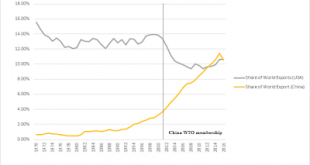By Thomas PalleyWhile rightly condemning Russia for its invasion, the mainstream media continues to selectively report the history behind these events. In my view, its omissions are intentional and contribute to the tragedy. They inflame public understanding, render a diplomatic resolution more difficult, and lock us into a worse trajectory. Let me make further clear my argument: (1) President Putin is head of the Russian state which is under slow-motion implacable attack by US-led NATO....
Read More »Gangsters want to be good people too
Alex Tabarrok had a great interview on Ezra Klein’s podcast. A lot of it is on what we learn from Mancur Olson about the current capture of US politics by interest groups. Whether it’s property developers or wealthy homeowners or poor renters or big oil, or whatever—these are groups that would trade off $100 of societal benefits for $1 to themselves. What struck me is how, afterwards, Tabarrok reflected on the moral economy, not the political economy, of this rent-seeking: I was especially...
Read More »Who votes versus who decides in the Democratic party
Democratic voters comprise a multiracial but predominantly white group of college graduates and a larger group of non-college voters. The non-college share of the Democratic coalition is split about 50:50 between white (of which non-college whites are such a large share of the American population that they accounted for fully one-third of Joe Biden’s voters, despite voting overwhelmingly for Trump) and non-white individuals. It is overall much less liberal on a range of issues, especially...
Read More »Why I do not expect a civil war in America (and what does worry me)
It began a few years ago, when prominent democracy rating organizations started downgrading the United States, putting its institutions on par with Panama, Argentina, or Romania. In retrospect, that seems like the good news. Last year, the international security and intelligence expert Greg Treverton predicted the breakup of the union in a piece titled Civil War Is Coming. And early this year, in a book titled The Next Civil War, journalist Stephen Marche outlined America’s many future...
Read More »Does buying organic save lives?
Pesticides are linked to negative health outcomes, but a causal relationship is difficult to establish due to nonrandom pesticide exposure. I use a peculiar ecological phenomenon, the mass emergence of cicadas in 13 and 17-year cycles across the eastern half of the US, to estimate the short and long-term impacts of pesticides. With a triple-difference setup that leverages the fact that cicadas only damage tree crops and not agricultural row crops, I show that insecticide use increases with...
Read More »Is the Worldly Philosophy Dead?
[embedded content] Instead of videos a series of podcasts on the history of political economy, and its relation to economic policy in the United States. This is based on a course I teach for undergraduates.
Read More »IPA’s weekly links
Guest post by Jeff Mosenkis of Innovations for Poverty Action. Good links from David McKenzie this week (as always), including this one from CSWEP on mentoring underrepresented minority women in economics.As much as it pains me to link to both David *and* my other Friday links competitor, Tim Ogden of NYU’s faiV, (which focuses on financial inclusion) he’s got a really good piece on CGAP’s blog. It’s ostensibly on what can we expect to learn from financial inclusion research, but really...
Read More »Globalization Checkmated? Political and Geopolitical Contradictions Coming Home to Roost
By Thomas Palley (Guest blogger)The deepening of economic globalization appears to have ground to a halt and the process may even unravel a little. The sudden stop has surprised economists, whose belief in globalization has strong parallels with Fukuyama’s (1989) flawed end of history hypothesis. The paper presents a simple analytic model that shows how economic globalization has triggered political and geopolitical contradictions. For the system to work, politics within countries and...
Read More »And I stupidly used to think Putin was smart. I pity the poor Russian people.
At his economic conference with other world leaders there, Putin said this... "We are hostages to this internal strife in the United States..." And I stupidly used to think Putin was smart. When one puts limits in one's own mind, even if they are imaginary, those limits can be debilitating. Putin, as the ruler of the largest country on earth, doesn't understand that Russia has no limits, especially none imposed by U.S. "internal strife," whatever that is. Pathetic. ...
Read More »China and US Trade Tensions in one graph
The graph below illustrates the reasons for the concerns in the US and the somewhat erratic, but more combative position of the Trump administration. Note, also, that China is closing the gap on R&D spending and on the technological front, at a faster pace that I would have predicted (more on that for a later post).
Read More » Heterodox
Heterodox


